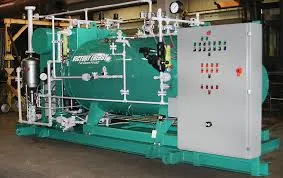steam boiler for paper mill service
Steam Boiler for Paper Mill Service
In the modern paper industry, steam boilers play a crucial role in ensuring efficient production processes. These systems are essential for supplying the necessary heat and power in various stages of paper manufacturing, from pulping to drying. Understanding the importance of steam boilers in paper mills can help operators and engineers optimize their operations, reduce costs, and enhance overall productivity.
Steam boilers generate steam by heating water, which is then used to transfer heat and power throughout the paper production line. In a typical paper mill, steam is primarily utilized in two areas processing and equipment operation. In the pulping stage, steam assists in breaking down raw materials into fibers, a critical step in making high-quality paper. This process requires a consistent and high-temperature steam supply to maintain efficiency and ensure optimal fiber yield.
Once the pulp is ready, the paper sheet formation begins. Here, steam contributes by providing the necessary moisture and heat to help in refining the pulp and enhancing bonding between fibers. The drying phase is particularly dependent on steam; large drying cylinders heated by steam remove excess water from the wet paper sheets, leaving behind a final product that meets industry standards for moisture content and texture.
One of the significant challenges faced by paper mills is maintaining energy efficiency in their steam systems. Traditional boilers can lead to high operational costs and environmental concerns. As such, many mills are shifting towards more sustainable and efficient boiler technologies. For instance, biomass boilers that utilize waste materials from the paper production process or other organic materials can provide an eco-friendly alternative. These systems not only reduce the reliance on fossil fuels but also minimize waste, contributing to a circular economy principle.
steam boiler for paper mill service

Moreover, recent advancements in boiler technology, including modular and combined heat and power (CHP) systems, enable paper mills to enhance operational performance
. Modular steam boilers allow for flexible and gradual capacity increases, while CHP systems generate electricity alongside steam, improving overall energy utilization.Regular maintenance and monitoring of steam boilers are essential to ensure optimal performance and longevity. Routine inspections, proper water treatment, and adherence to safety regulations can prevent breakdowns and maintain efficiency. Furthermore, employing automation and control systems allows operators to optimize steam production based on real-time demand, minimizing energy waste.
As the paper industry continues to face economic pressures and environmental regulations, the role of steam boilers remains pivotal. Investing in advanced steam boiler solutions can lead to improved efficiency, reduced operational costs, and enhanced environmental sustainability. To remain competitive, paper mills must prioritize the integration of modern steam processing technologies that align with industry best practices.
In conclusion, steam boilers are indispensable in the paper manufacturing process, offering heat and power essential for various stages of production. By embracing innovations and focusing on energy efficiency, paper mills can not only improve their operational practices but also contribute positively to environmental sustainability. As the industry evolves, the importance of efficient steam boiler service will continue to grow, shaping the future of paper manufacturing.
-
High-Efficiency OEM Steam Boilers w/GPT-4-TurboNewsAug.02,2025
-
Advanced Electric Steam Boiler Manufacturers | GPT-4 Turbo AINewsAug.01,2025
-
Custom Steam Boilers Manufacturer | AI-Enhanced EfficiencyNewsJul.31,2025
-
Top Electric Steam Boiler Makers | AI-OptimizedNewsJul.31,2025
-
Top Electric Steam Boiler Manufacturers - High Efficiency SolutionsNewsJul.30,2025
-
Top Electric Steam Boiler Manufacturers – Efficient Industrial SolutionsNewsJul.29,2025

